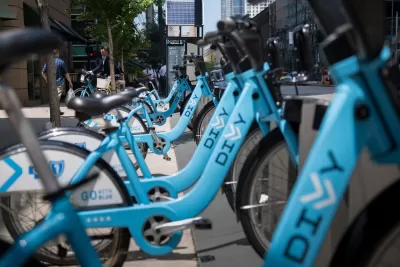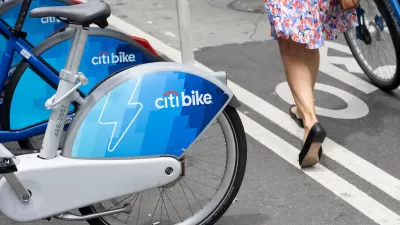New York and Chicago asked residents to suggest sites for new docking stations. Most were not put at those locations, but that doesn’t mean collecting public input is not a useful and important part of the planning process, say researchers.

A study about bikeshare and public participation shows that most docking stations are not sited in locations recommended by the public. New York solicited input for its 2014–2015 expansion, and just 5 percent of new stations were built near the 2,000 sites suggested. In Chicago, 10 percent of new docking stations were near locations recommended through an interactive online map.
But, these findings do not necessarily indicate that public officials and planners do not consider public input, say researchers Greg Griffin and Junfeng Jiao. Many considerations go into the design of a bikeshare system, including prioritizing gaps in the network, finding locations where stations can be placed, and contending with public resistance to proposed dock sites.
Griffin and Jiao say that their analysis provides useful lessons for cities about engaging residents. "The online maps enabled residents to take direct action in planning their cities, rather than just commenting on the ideas of planners—or waking up to discover a docking station had been built outside their door," they note.
In addition, they say engagement efforts that leave records, such as the bikeshare ones in New York and Chicago, allow researchers to better understand the outcomes and effectiveness of public outreach.
FULL STORY: Why Do Cities Discount Public Input in Expanding Bikeshare Systems?

Alabama: Trump Terminates Settlements for Black Communities Harmed By Raw Sewage
Trump deemed the landmark civil rights agreement “illegal DEI and environmental justice policy.”

Study: Maui’s Plan to Convert Vacation Rentals to Long-Term Housing Could Cause Nearly $1 Billion Economic Loss
The plan would reduce visitor accommodation by 25% resulting in 1,900 jobs lost.

Planetizen Federal Action Tracker
A weekly monitor of how Trump’s orders and actions are impacting planners and planning in America.

Waymo Gets Permission to Map SF’s Market Street
If allowed to operate on the traffic-restricted street, Waymo’s autonomous taxis would have a leg up over ride-hailing competitors — and counter the city’s efforts to grow bike and pedestrian on the thoroughfare.

Parklet Symposium Highlights the Success of Shared Spaces
Parklets got a boost during the Covid-19 pandemic, when the concept was translated to outdoor dining programs that offered restaurants a lifeline during the shutdown.

Federal Homelessness Agency Places Entire Staff on Leave
The U.S. Interagency Council on Homelessness is the only federal agency dedicated to preventing and ending homelessness.
Urban Design for Planners 1: Software Tools
This six-course series explores essential urban design concepts using open source software and equips planners with the tools they need to participate fully in the urban design process.
Planning for Universal Design
Learn the tools for implementing Universal Design in planning regulations.
Caltrans
Smith Gee Studio
Institute for Housing and Urban Development Studies (IHS)
City of Grandview
Harvard GSD Executive Education
Toledo-Lucas County Plan Commissions
Salt Lake City
NYU Wagner Graduate School of Public Service





























